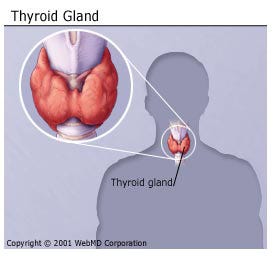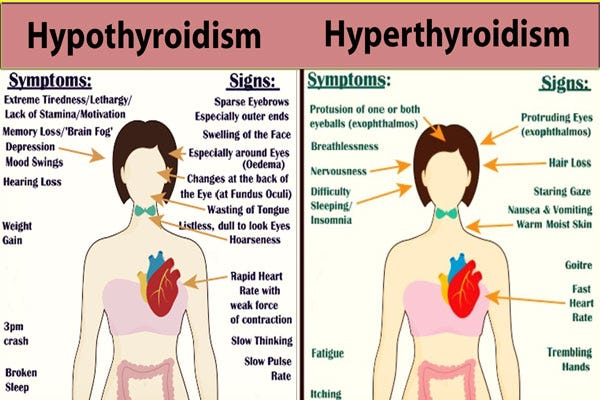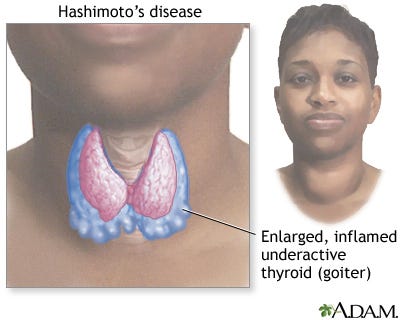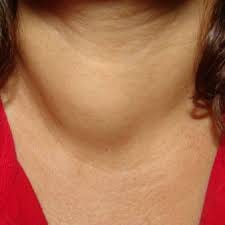Thyroid Diorders

The thyroid is a small, butterfly shaped gland that is located below the Adam’s apple wrapped around the trachea (windpipe). It is a part of an intricate network of glands called the endocrine system which is responsible for coordinating various body activities. A thin area of the tissue that is present in the middle of the gland, known as isthmus is the one that joins the two thyroid lobes on each side. This thyroid gland manufactures hormones that help in regulating the body’s metabolism.
The 6 common Thyroid Disorders are-
- Hyperthyroidism
- Hypothyroidism
- Hashimoto’s disease
- Grave’s Disease
- Goiter
- Thyroid Nodules
Hyperthyroidism
In hyperthyroidism, the thyroid gland is seen to be overactive, that is it produces too much of its hormone. Grave’s disease, Autoimmune disorder and Multi nodular thyroid causes antibodies to stimulate the thyroid to secrete too many hormones. Other causes include, intake of excess iodine, thyroiditis, tumors of the ovaries and testes, benign tumors of the pituitary glands and large amount of tetraiodothyronine that is taken through dietary supplements or medication.
Symptoms- The symptoms include restlessness, nervousness, racing heart, irritability, increased sweating, muscle weakness, weight loss and brittle hair and nails.
Diagnosis- A blood test measures levels of thyroid hormone, T4 and thyroid stimulating hormone(TSH) in the blood. High Thyroid and low TSH levels give an indication that the thyroid gland is overactive.
Treatment- Treatments for the same helps in destroying the thyroid gland or block it from producing any further hormones.
- Antithyroid drugs such as METHIMAZOLE (TAPAZOLE), prevents from producing more hormones.
- Also, a large dose of radioactive iodine damages the glands.
- A surgery is also recommended to remove the gland.
However, if you are undergoing surgery or radioactive iodine treatments then you are likely to develop hypothyroidism and should take thyroid hormone daily.

Hypothyroidism
In this case, the thyroid gland is under active and it can't produce enough of the hormones thus the normal functioning of the body slows down. Hashimoto’s Thyroid is an autoimmune condition and is one of the most common causes for hypothyroidism. Since the number of hormones produced are less, the immunity system tends to confuse between normal and healthy cells. Thus it attacks the thyroid gland and causes chronic thyroid inflammation .
Symptoms- It leads to symptoms such as fatigue, dry skin, memory problems, constipation, depression, slow heart rate and come.
Diagnosis- A blood test is required to examine Hypothyroidism. A high TSH level and low thyroxine level means that thyroid is under active.
Treatment- Hypothyroidism is best treated with Levothyroxine(Levothroid,Levoxyl). People might have to stay on this medication for their lifetime. This medicine shall be taken n proper doses under proper guidance of the doctor because taking too much of it can lead to hyperthyroidism. Also, frequent blood tests should be done to determine the level of thyroid glands.
Hashimoto’s Thyroiditis
Hashimoto’s Thyroiditis is also known as Chronic lymphocytic thyroiditis. It can occur at any age but mostly in middle aged women, because the immune system by mistake attacks and destroys the thyroid gland. The causes are unknown but there are a lot of risk factors involved, like, Grave’s disease, Type1 disease, Vitiligo, Rheumatoid Arthritis and Addison’s disease.
Symptoms- The symptoms include depression, fatigue,mild weight gain, constipation, dry skin, pale, puffy face, intolerance to cold, enlarged thyroid or goiter.
Diagnosis- A blood test is done to examine the level of TSH and low levels of Thyroid hormone. High levels of TSH and low levels of T3 or T4 cells indicate it. A cholesterol checkup is also required at this stage.
Treatment-Levothyroxine is what is recommended for this type of thyroid. It gets the thyroid levels to normal and thus the symptoms are meat to disappear on its own.

Grave’s Disease
Grave’s disease is named after the doctor who first found it 150 years ago. It is a hereditary disease which is usually seen in middle aged women, but it is also common in men and can come in any age. The causes that lead this are autoimmune disorder, stress, pregnancy and smoking.
Symptoms- When the level of thyroid is high, the body’s system speed up and cause symptoms like anxiety, irritability, fatigue, hand tremors, excess sweating, altered menstrual cycle, goiter and bulging eyes with vision problems.
Diagnosis- The doctor may advise you to take a blood test, throid scan, radioactive iodine uptake test, TSH test and TSI,Thyroid stimulating immunoglobin test.
Treatment- 3meds, the best online medical app in India prescribes the treatments as-
- Grave’s disease is treated through Antithyroid drugs, such as Propylthiouracil and Methimazole. Beta blockers may also be suggested.
- Radioiodine therapy is also suggested where doses of radioiodine-131 are prescribed.
- Thyroid surgery is also recommended.
Goiter
Goiter is a noncancerous enlargement of the gland which can occur at any age. The most common cause is iodine deficiency in the diet. Thus, it is commonly found in areas where iodine deficiency is severe. Other causes include family medical history, certain medication usage, pregnancy, radiation exposure.
Symptoms- The goiter may cause following symptoms if it is grown large in size, like swelling or tightness in the neck, difficulties in breathing or swallowing, coughing or wheezing and hoarseness of voice.
Diagnosis-The doctor checks the neck for swelling. Other tests are also done to determine the hormone levels, like blood tests, thyroid scan when the thyroid levels have elevated, an ultrasound to check the size and condition of the goiter and a biopsy if thyroid nodules are there.
Treatment-No specific medication is followed for this, however, if the goiter is too large, surgery is advisable. Radioactive iodine may be necessary and it is necessary to control your iodine diet based on the blood tests done to detect the thyroid glands.

Thyroid Nodules
Thyroid nodules are the growth that form on or inside the thyroid gland. The nodules can be solid or fluid filled The causes associated are iodine deficiency, Hashimoto’s thyroiditis. It is common in both men and women.
Symptoms- Symptoms include high pulse rate, nervousness, increased appetite, tremors, clammy skin, hair loss, dry skin and cold intolerance.
Diagnosis-Most nodules are easily detected through physical exam however ultrasound, CT scan or MRI can also be done. A TSH test, thyroid scan and a fine needle aspiration biopsy is also done.
Treatment- Radiation therapy with or without surgery is advised. A chemotherapy may also be required if the cancer growth has increased or has been detected.
Outlook
Thyroid is a disease that may or may not stay with you for a lifetime but it requires proper attention and medication. Thus, it is advisable to have thyroid tests at regular intervals and have a proper diet based on it. The medicines prescribed can also be ordered from nearby medical stores or order medicine online in India.



Comments
Post a Comment